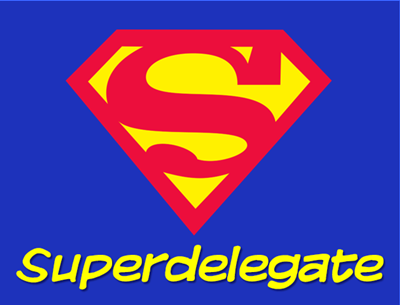May 31, 2016 •
Primer: Democratic Superdelegates
 As the primaries come to an end, more and more is being heard about the superdelegates’ role in choosing the Democratic nominee. But what exactly are superdelegates? How did they become part of the nominating process? And what do they mean in this year’s nominating process?
As the primaries come to an end, more and more is being heard about the superdelegates’ role in choosing the Democratic nominee. But what exactly are superdelegates? How did they become part of the nominating process? And what do they mean in this year’s nominating process?
Simply put, superdelegates are unpledged delegates. They can be party leaders and elected officials or individuals who are selected by the party to attend the convention. These delegates, because they are unpledged, can give their votes to any candidate they choose, regardless of how their state voted.
Superdelegates became a part of the Democratic nominating process following the 1980 convention. At that convention Sen. Ted Kennedy had fought to win the nomination from President Jimmy Carter through rule changes. It was a contentious convention, with the fight focusing on Rule 11(H), which required delegates to support the candidate to which they were bound by the primary process. In order to avoid another convention fight, the rule was rewritten for the 1984 convention (and is still in effect today). Delegates pledged to a specific candidate are no longer be required to support the candidate; instead, they are strongly urged to support the candidate “in all good conscience.”
However, some party members were still worried about a convention fight even with the new rule. A plan was proposed to have a percentage of convention delegates be unpledged voting delegates. It was hoped such change would allow the party to respond to changing circumstances, to better address situations where the electorate hasn’t clearly chosen a candidate, and to include more elected officials in the convention voting without requiring them to declare for one candidate or another.
It was during this process when the term “superdelegate” was coined.
The final agreement allowed for 14 percent of convention delegates to be unpledged delegates and congressional delegates were to be chosen by the congressional caucuses in the House and Senate.
Today, superdelegates are no longer chosen by the caucuses, and the ratio of unpledged delegates to pledged delegates has changed with the addition of more unpledged delegates over the years.
In this year’s Democratic primary campaigns, superdelegates have been come an issue on the campaign trail. Because so many superdelegates have pledged early to support Hillary Clinton, her delegate numbers give her a huge lead over Bernie Sanders.
As of May 27, Clinton has 2,309 delegates to Sander’s 1,539. But when the superdelegates are removed from the count, Clinton has 1,769 pledged delegates to Sander’s 1,497. To win the nomination, the Democratic candidate needs a total of 2,383 delegate votes.
This year it appears the superdelegates will decide who the nominee will be. Because of the early and overwhelming majority of superdelegates pledging to Clinton, the delegate count has been showing Clinton with a huge lead over Sanders, when in fact the primary outcomes indicate a much closer race.
Many of Sanders’ supporters tried to convince superdelegates to refrain from pledging to a candidate too early. They felt that by pledging early, superdelegates were skewing the media coverage and perception of success in favor of one candidate over another. The media was treating Clinton as the presumptive candidate and providing more coverage of her campaign than of Sander’s campaign.
With this year’s Democratic primaries, superdelegates are going to be the deciding force. While some might say superdelegates are imposing the party’s candidate on the people, others will say superdelegates are fulfilling their intended role: to avoid a contested convention and ensure the nominee is able to enter the general election with a clear mandate and the firm support of the party.
Sources:
Andrews, Wilson; Bennett, Kitty; and Parlapiano, Alicia. 2016 Delegate County and Primary Results. The New York Times. May 27, 2016.
Kamarck, Elaine. A History of ‘Super-Delegates’ in the Democratic Party. February 14, 2008.
Strauss, Daniel. Sanders Supporters Revolt Against Superdelegates. Politico. Febraury 14, 2016.
State and Federal Communications, Inc. provides research and consulting services for government relations professionals on lobbying laws, procurement lobbying laws, political contribution laws in the United States and Canada. Learn more by visiting stateandfed.com.

